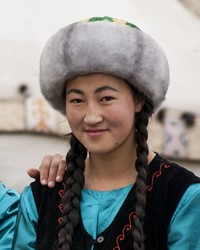Kyrgyz in Kazakhstan

Photo Source:
Theklan - Wikimedia
Creative Commons
|
Send Joshua Project a map of this people group.
|
| People Name: | Kyrgyz |
| Country: | Kazakhstan |
| 10/40 Window: | Yes |
| Population: | 42,000 |
| World Population: | 6,063,100 |
| Primary Language: | Kyrgyz |
| Primary Religion: | Islam |
| Christian Adherents: | 4.00 % |
| Evangelicals: | 0.40 % |
| Scripture: | Complete Bible |
| Ministry Resources: | Yes |
| Jesus Film: | Yes |
| Audio Recordings: | Yes |
| People Cluster: | Kyrgyz |
| Affinity Bloc: | Turkic Peoples |
| Progress Level: |
|
Introduction / History
The Kyrgyz are a Turkic people who have their origins in southern Siberia and northeastern China. Slowly they migrated to Mongolia and beyond. In the 9th century Kyrgyz forces allied with China's Tang Dynasty to defeat the Uyghurs. In the 13th century they had to flee from the advancing Mongol Empire. The Kyrgyz became a distinct nationality in the 14th century. They settled in highland dwellings of northwestern China during the 15th century. For centuries they have often needed to flee dangerous nations. Most of them are sandwiched between superpowers, Russia and China. In the 20th century alone, many fled the power struggle in Russia leading up to the Bolshevik Revolution and the Chinese Communist Revolution in 1949. In the midst of their vulnerable situation the Kyrgyz strive to maintain their own ethnic identity. They live a semi-nomadic lifestyle. Though the Kyrgyz have their own nation, Kyrgyzstan, there are some who live in each of the Central Asian countries including Mongolia and Iran. They also live in Russia, and even some Western nations. In most of these places, including Kazakhstan, they are small in number.
What Are Their Lives Like?
Most of the Kyrgyz are herdsmen who raise cattle, horses, sheep, camels, and goats. They live in white felt tents that are easily moved from place to place. They have particularly hardy and adaptable breeds of sheep, goats, yaks, horses, and camels. Not only are the animals used for food and exchange, but they also provide the only means of transportation in the region. The people, like the animals, must be able to endure harsh conditions like high altitudes. While the men take care of duties such as chopping wood or cutting grass, the women are responsible for milking, shearing, and grazing the animals. Women also take care of the household duties. Kyrgyz women enjoy more freedoms than do most other Central Asian women. They are not required to wear veils. Women are allowed to talk to men and ride freely about on the grasslands. They work hard and their position in the household is respected. The Kyrgyz eat mainly potatoes, onions and cabbage since these are the only vegetables that can grow in this mountainous area. Goats supply them with their favorite drink: goat's milk. Their diet also includes imported products such as wheat, flour, rice, tea, salt, and sugar. Alcoholism is a serious problem that dominates the lives of many of the Kyrgyz. Some of them go on drinking binges that last several days at a time. Kyrgyz marriages are arranged by the parents. A special gift such as a roasted sheep, is presented to the bride-to-be from the groom as part of the courting process. One interesting tradition is that the engaged couple is tied to posts near the bride's family. They are released only after the groom's family begs for mercy and presents gifts to the bride's family. The couple is then married in a Muslim wedding ceremony.
What Are Their Beliefs?
Consecutive waves of Islamization have taken place since the Arabs first invaded Talas in 751 when many Kyrgyz tribes were still in Siberia. Northern nomadic tribes were able to skirt many of the Islamic traditions until recently. Within the last two hundred years, the majority of the Kyrgyz had been completely converted to Islam. Today, almost all Kyrgyz in Kazakhstan consider themselves to be Muslim; however, they hold onto some shamanistic practices. (Shamanism is the belief that there is an unseen world of many gods, demons, and ancestral spirits that must be dealt with through a shaman). Many people still turn to mediums and seers to cure sickness with magic, communicate with spirits, and control events. Almost all Kyrgyz believers have to go through a breaking of demonic powers over their lives once they decide to follow Christ. The Kyrgyz epic hero Manas has taken on god-like status among some Kyrgyz. His story reveals many practices and beliefs of the pre-Islamic Kyrgyz. There have been some comparisons made between the biblical "Manasseh son of Jacob" (Genesis 48) and the Kyrgyz "Manas son of Jakyb. "
What Are Their Needs?
The Kyrgyz people in Kazakhstan have no hope in their spiritual lives. God desires that they will come to know abundant life through His son, Jesus Christ. The tragic reality, however, is that the Kyrgyz are unaware of the redeeming blood of Christ and that eternal life is theirs through him.
Prayer Points
Pray for the Kyrgyz culture to be renewed and enhanced by a work of the Holy Spirit and shaped into a God-centered and God-honoring mold. Pray for the Holy Spirit to move among Kyrgyz family and community leaders to seek His face and enjoy His blessings. Pray for the Lord to thrust out workers who will be compelled to nurture a movement to Christ among the Kyrgyz people in Kazakhstan. Pray that soon the Kyrgyz people will have faith that will lead them to live honorable lives that will draw others to the Savior.